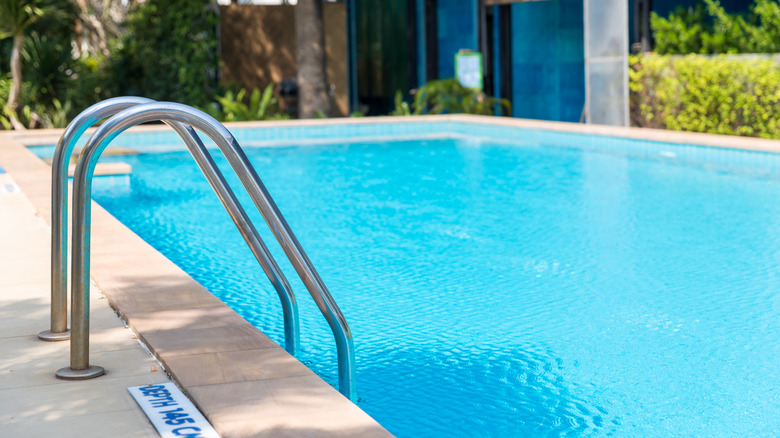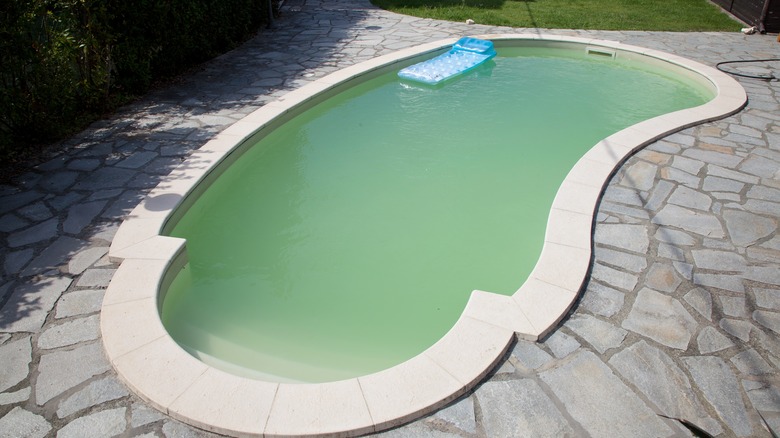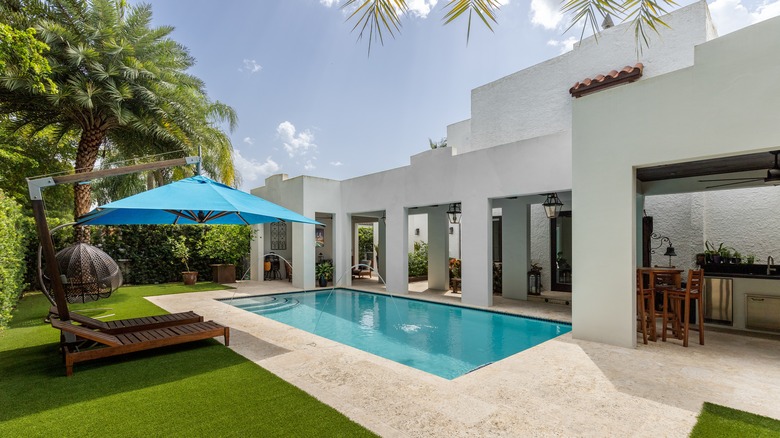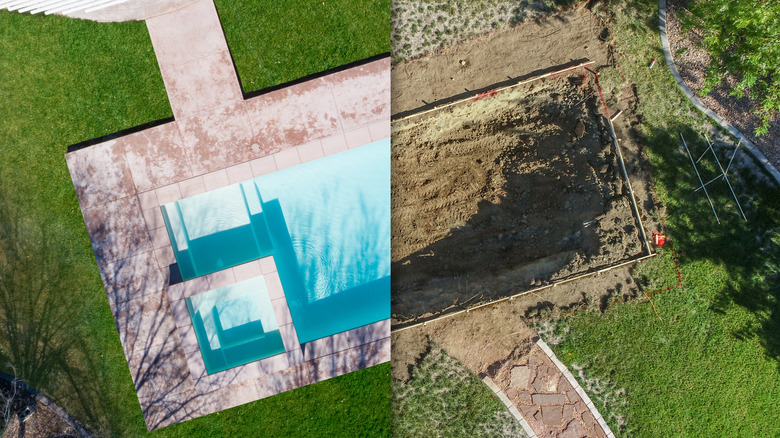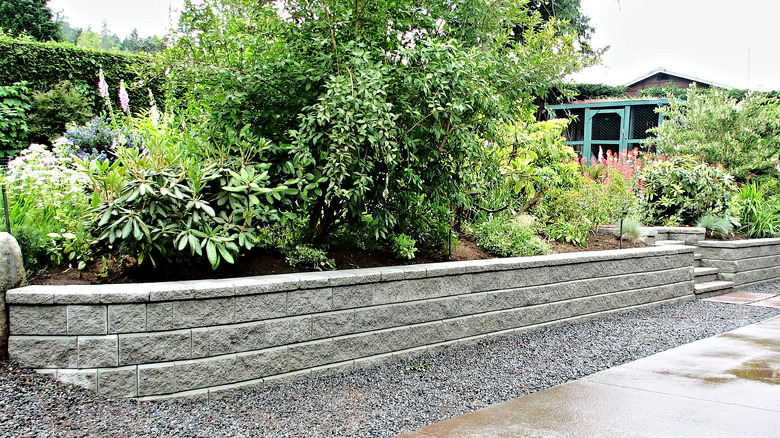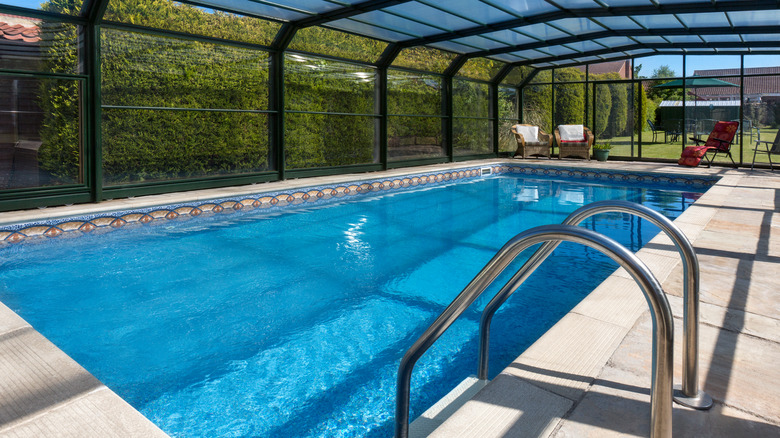How Much Does It Cost To Have An Inground Pool?
Inground pools are the ultimate luxury in the summertime, and more and more homes are incorporating them into their backyard plans. Parents of young children know the struggle of packing up, trekking kids to the gym or local public pool, and dealing with wet clothes and soggy belongings afterward. The process can be exhausting, making the convenience of a pool at home truly a dream come true. For adults who love to host parties, a pool is a great way to draw a crowd — whether it's for a swim party or simply creating an appealing ambiance.
Pools can be fun, inviting, and even romantic, according to pool experts like Swimming Pool Steve. There are plenty of reasons to want one! However, installing an inground pool can also be pricey. How much does it actually cost? Are there any hidden expenses? There's a lot to consider financially when making such a huge renovation to your yard. Knowing the answers to these questions can help you make an informed decision.
Base cost of installing a pool
Inground pools are a wonderful addition to any backyard, but they definitely cost a pretty penny. According to Bob Vila, the average cost of an inground pool ranges between $38,719 and $69,599. The national average is $51,833. The cost of inground pools varies depending on the materials used and the long-term costs included in your initial pool package. Three different materials are typically used to build a pool: vinyl, concrete, and fiberglass. There is a significant price variation between the different materials, with vinyl being the most affordable option to install and fiberglass being the priciest.
Turnkey pool installations usually include the electrical system, plumbing, pumps, a simple deck, and even a fence for safety. Costs increase when you start adding more details. These include the size and shape of the pool, any custom lighting, water features, large or elaborate decks, heating, or higher-end fencing. The location of the pool also matters because if your installation requires significant excavation and landscaping to clear the way for the pool, it will ramp up in cost.
Cost of permits
A whole lot more goes into your pool installation than a contractor simply coming in and starting to dig. Digging and filling are factored into the initial cost, but you will very likely also need permits. According to Swimmingpool.com, almost every city requires a building permit to install an inground pool. This ensures that everything is done safely and correctly. The last thing you want is a contractor that skips steps. A pool is a huge investment and can cause costly issues if built incorrectly. While the cost of permits can be annoying and feel unnecessary, they are put in place to protect you in the long run.
Outside of a building permit, you might also need an electrical permit. Permits can cost between $450 and $1,800 per permit, and usually, the contractor and electrician working on your pool will take steps to obtain these, according to Home Advisor. If you have an HOA, you should also check with them to ensure you don't need any special permissions.
Choosing style and materials
According to HomeAdvisor, the typical size of an inground pool is around 14 by 28 feet with a depth of approximately 6.5 feet. Depending upon the economy, you can expect to spend anywhere from $50 to $125 per square foot. The cost of materials has skyrocketed in recent years, so if you are building your pool soon, figure costs to be at the higher end. Pool depth will also affect price, as the deeper the pool, the more digging and more material. Deeper pool designs will always be at the higher end. If you enjoy diving, it is recommended to have at least a 9-foot pool depth at one end.
Standard square pools will always be the most affordable. However, concrete pools can come in a variety of shapes, including rectangle, kidney, circle or oval, and L-shaped. Fiberglass pools are very popular due to their durability and compatibility with saltwater systems, but they cannot be customized into various shapes. Concrete is also durable and fully customizable, but they are high maintenance and have expensive chemical costs. Vinyl pools are the most affordable but also the least durable. You can expect to change out their liner every five to nine years, per Bob Vila.
Smaller pool options
Larger pools measuring about 18 by 36 feet are much more easily able to accommodate a deep end of up to around 12 feet. This is the most expensive option, with a starting price tag of around $35,000, per Home Advisor. Smaller pools, like plunge, spool, and cocktail pools, will start at around $10,000 for the smallest and simplest, up to around $25,000. This Old House states these pools usually measure about 10 feet wide by 20 feet long and are 5.5 to 7 feet deep.
These small pools can also have special lighting, customized stairs, and water features. They use the same filtering systems as their larger siblings but are more affordable because they require less energy and chemicals. The heating systems in smaller pools can warm the water faster as well, and you can even install jets if you wish to make it a lap pool. Smaller pools are an ideal choice for homes with smaller lots because you can cool off, relax, and not have to worry about higher installation or maintenance costs.
Labor and location
Labor costs are a huge factor in determining pool price. A good contractor will be upfront about labor costs, and it's important to know what you're getting into financially before the digging starts. Material type will also affect labor costs. Concrete will take longer to install than fiberglass because it needs to be mixed, poured, shaped, and set. On the other hand, fiberglass is manufactured ahead of time offsite and simply brought into the yard to be installed, explains Bob Vila. Additionally, if you live in a home with a yard that requires a lot of unique excavating, like removing large trees or clearing a root system, then labor costs will also increase.
Location also makes a difference in price. Northern states tend to pay 15 to 25% more, while Texas, Arizona, and Florida tend to be more affordable. In the latter regions, concrete and fiberglass pools can be comparable in price. Location can even affect labor costs. For example, in a location like California, with its notoriously high cost of living, the labor price will be higher.
About that landscaping
As described by Homes and Gardens, there are many landscaping options to choose from when it comes to planning a pool installation. From simple to elaborate, landscaping plays a prominent role in pool pricing, and it can cost $1,500 to $5,200 to make way for the pool while adding visual interest, according to Home Advisor. To put it another way, landscapers will typically charge $4 to $12 per square foot to add foliage, including trees, plants, and shrubs. Landscaping rocks can cost anywhere from $400 and $1,000, depending upon the style and type you choose, explains Bob Vila.
Retaining walls are common in pool construction, so prepare yourself for a higher price tag if you have a slope in your yard. It can cost up to $13,000 to make a yard level, but of course, many yards come in at a more affordable price — even as low as $1,200. It's important to note that pools can actually be built into a slope by adding an infinity edge to the pool, but this won't save you money. Instead, it's all about style preference.
Extras and maintenance
Electrical work to install an inground pool isn't usually a huge expense, coming in at around $2,000. However, if you want a heated pool, the pool heater installation will cost you more, explains Bob Vila. After the initial installation cost of up to $4,000, you will have monthly charges whenever you use the heater. The price tag for this is a huge range because climate varies significantly across the country. Depending on where you live, the season, and how often you use the pool, you can expect to pay between $100 and $600 each month. According to Pool Supply World, it costs $3.30 to $4.40 per hour to heat a standard-size pool.
Other fun pool features include beach entry, which will run you between $50 and $125 per square foot. Lagoon-style pools are also beautiful in appearance and cost up to $150,000. Lastly, hot tubs are a must-have for many pool owners. A built-in hot tub can cost up to $20,000.
Want to swim year-round? Consider splurging for a pool enclosure. These cost between $5,000 and $15,000 and can be created from mesh, glass, plastic, or vinyl, per Home Advisor. They retain heat, keep your water cleaner for longer periods of time, and allow you to swim year-round.
